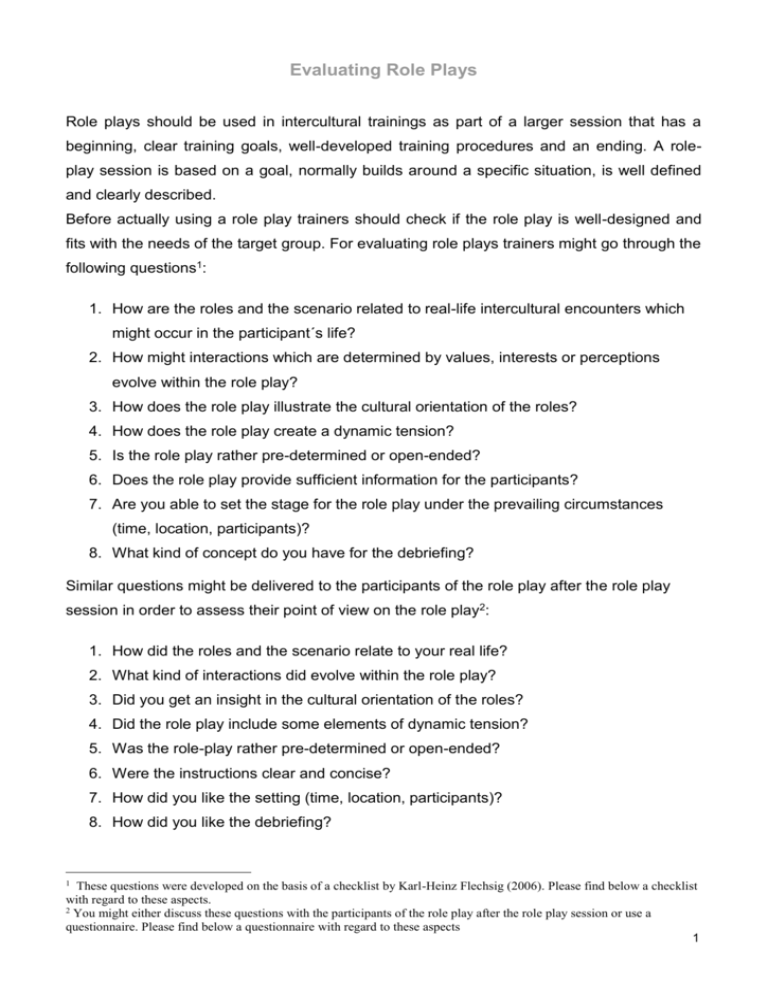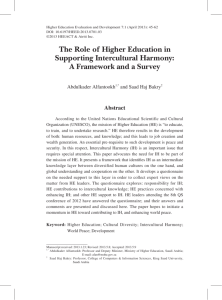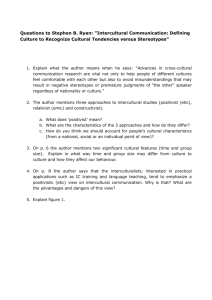Evaluating Role Plays
advertisement

Evaluating Role Plays Role plays should be used in intercultural trainings as part of a larger session that has a beginning, clear training goals, well-developed training procedures and an ending. A roleplay session is based on a goal, normally builds around a specific situation, is well defined and clearly described. Before actually using a role play trainers should check if the role play is well-designed and fits with the needs of the target group. For evaluating role plays trainers might go through the following questions1: 1. How are the roles and the scenario related to real-life intercultural encounters which might occur in the participant´s life? 2. How might interactions which are determined by values, interests or perceptions evolve within the role play? 3. How does the role play illustrate the cultural orientation of the roles? 4. How does the role play create a dynamic tension? 5. Is the role play rather pre-determined or open-ended? 6. Does the role play provide sufficient information for the participants? 7. Are you able to set the stage for the role play under the prevailing circumstances (time, location, participants)? 8. What kind of concept do you have for the debriefing? Similar questions might be delivered to the participants of the role play after the role play session in order to assess their point of view on the role play2: 1. How did the roles and the scenario relate to your real life? 2. What kind of interactions did evolve within the role play? 3. Did you get an insight in the cultural orientation of the roles? 4. Did the role play include some elements of dynamic tension? 5. Was the role-play rather pre-determined or open-ended? 6. Were the instructions clear and concise? 7. How did you like the setting (time, location, participants)? 8. How did you like the debriefing? 1 These questions were developed on the basis of a checklist by Karl-Heinz Flechsig (2006). Please find below a checklist with regard to these aspects. 2 You might either discuss these questions with the participants of the role play after the role play session or use a questionnaire. Please find below a questionnaire with regard to these aspects 1 Moreover you might evaluate a role play by your observations as a trainer when conducting the role play. Please find below a collection of relevant aspects to note your observations 3. 1. Please describe and assess the prevailing circumstances of the setting for conducting the role play with regard to: - The number of participants: Was the size of the group too big, optimal or too small? - The amount of time: Did you have enough time to conduct the role play? - The room: Did the room provide enough space to conduct the role play? - The required equipment: Would you have needed more or better equipment? 2. Please descibe and evaluate the introduction phase according to: - The motivation of the participants to take part in the role play: Were the participants motivated to take part in the role play or were there any resistances? - The comprehension of the participants: Did the participants easily understand the purpose and the task of the role play or were there any difficulties / questions? 3. Please describe and evaluate the preliminary phase of the role play with regard to: - The allocation of roles: Did you manage to allocate roles easily or were there any difficulties? - The preparation for the tasks: Did the participants easily prepare for their tasks or were there any difficulties? 4. Please describe and assess the role play phase according to: - The behaviour of the actors: Did the actors behave according to their roles? - The behaviour of the observers: Did the observers manage to fulfill their assigned task or were there any difficulties? - Progression of the role play: Did the role play evolve dynamically or did it rather stagnate? 5. Please describe and evaluate the debriefing with regard to: - The observations of the participants: Did the participants observe some interesting aspects? - The conclusions of the participants: Were the participants able to draw conclusions from their observations? - Transfer to real-life situations: Were the participants able to transfer some aspects to real-life situations? 3 Please find an observation sheet for trainers including these aspects attached to this document. 2 Checklist for trainers The following questions might be used to evaluate a role play before using it in an intercultural training. It might help you to describe the usefulness of a role play and draw conclusions for conducting the role play in a training session. 1. How are the roles and the scenario related to real-life intercultural encounters which might occur in the participant´s life? 2. How might interactions which are determined by values, interests or perceptions evolve within the role play? 3. How does the role play illustrate the cultural orientation of the roles? 4. How does the role play create a dynamic tension? 5. Is the role play rather pre-determined or open-ended? 6. Does the role play provide sufficient information for the participants? 7. Are you able to set the stage for the role play under the prevailing circumstances (time, location, participants)? 8. What kind of concept do you have for the debriefing? 3 Questionnaire for participants of a role play Dear participant! This questionnaire has been developed in the framework of the project INTEGRATION which aims at improving intercultural competence of staff members in different European institutions. With this questionnaire we would like to ask you for your personal view on the role play which you were involved in. We are interested in your intuitional response and your opinion.This information will help us to improve our learning material for intercultural training. Your data will of course be kept confidential. Thank you for taking part! 1. How did the roles and the scenario relate to your real life? 2. What kind of interactions did evolve within the role play? 3. Did you get an insight in the cultural orientation of the roles? 4. Did the role play include some elements of dynamic tension? 5. Was the role-play rather predetermined or open-ended? 6. Were the instructions clear and concise? 7. How did you like the setting (time, location, participants)? 8. How did you like the debriefing? 4 Observation sheet for trainers The following sheet might be used to note what you observed as a trainer when conducting a role play. It contains some central categories with subcategories. You might describe each subcategory according to what you observed during the role play (see column “description”). Afterwards you might outline for each category positive aspects or difficulties (see column “evaluation”). Aspect Setting Description Evaluation Number of participants Amount of time Room Equipment Introduction Motivation of the participants Comprehension of the participants Preliminary Phase Allocation of roles Preparation for the task Role Play Phase Behavior of the actors Behaviour of the observers Progression of the role play Debriefing Observations of the participants Conclusions of the participants Transfer to real-life situations 5 References: Flechsig, Karl-Heinz (2006): Materialien zum interkulturellen Training. Göttingen: Institut für Interkulturelle Didaktik. 6



